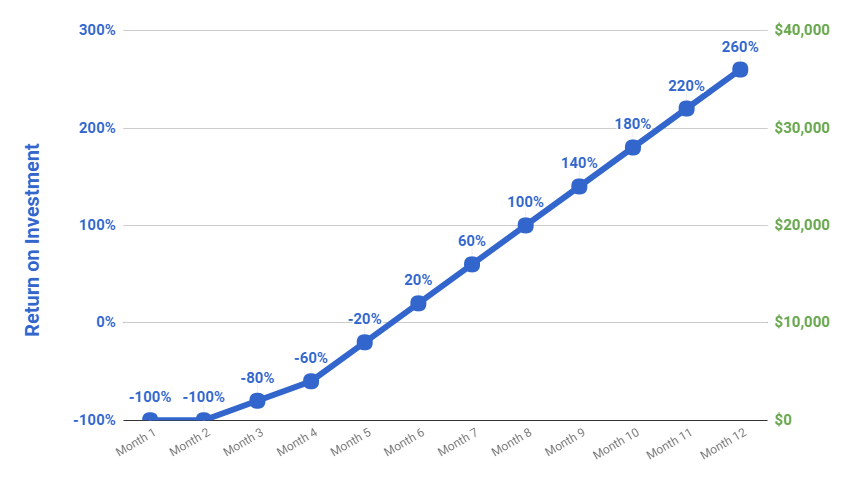ROI For SEO and the Ways to Calculate it
ROI For SEO and the Ways to Calculate it
ROI (Return on Investment)
It is a statistic used to assess the profitability or effectiveness of an investment in relation to its cost. ROI refers to the measurement of the return or value provided by your SEO efforts in comparison to the resources (time, money, and effort) put in the optimization process in the context of SEO (Search Engine Optimization).
Measuring SEO
ROI entails tracking and analyzing various indicators to establish the impact of your optimization efforts on the effectiveness of your website and overall company goals.
Here are some steps to help you calculate SEO ROI:
Outline aims:
Clearly outline your SEO campaign’s aims and objectives. This could include increasing organic search traffic, optimizing keyword rankings, increasing conversions, or increasing income. Having precise targets will allow you to effectively measure the effectiveness of your SEO efforts.
Install Analytics:
Install a powerful analytics system, such as Google Analytics, on your website. Check that it is set up correctly to track relevant metrics such as organic traffic, conversions, revenue, and other key performance indicators (KPIs). This will provide you with the data you need to calculate ROI.
Track Organic Traffic:
Using analytics tools, track the organic search traffic to your website. Analyze trends, discover changes after implementing SEO tactics, or tactics, and assess organic traffic increase over time.
Track the ranks of your desired keywords
In search engine results pages (SERPs) and analyze them. Tools such as SEMrush and Moz can assist you in tracking keyword rankings and identifying changes as a result of SEO activities.

Analyze Conversions:
Count the number of conversions or desired actions taken by organic search traffic visitors. This could include purchases, form submissions, sign-ups, or other clearly specified objectives. To correctly monitor these data, set up conversion tracking in your analytics software.
Assign Monetary Value:
Give each conversion or intended action a monetary value. This could be the average order value, lifetime customer value, or revenue generated per conversion. You may calculate the monetary impact of SEO-driven conversions by assigning a value to them.
Calculate Costs:
Determine the costs of your SEO campaign. This covers SEO tool expenditures, agency fees, content production, link building, and any other costs that may be incurred. To get a realistic picture, include both direct and indirect costs.
To determine the ROI of SEO, examine the following factors:
Organic Search Traffic:
Track the rise in organic search traffic to your website as a result of SEO activities. Google Analytics, for example, can assist you in tracking and analyzing the traffic to your website.
Conversions:
Determine the amount of conversions or desired actions taken by organic search traffic visitors. Purchases, form submissions, email sign-ups, and any other relevant goal might be included.
Revenue:
A monetary value should be assigned to each conversion or intended action. Total the revenue generated by these conversions.
Costs:
Assess the expenses involved with your SEO initiatives. This may include costs for SEO tools, the employment of an SEO consultant or agency, content production, link building, and any other relevant costs.
Once you have the necessary information, you can use the following formula to determine SEO ROI:
(Revenue – Costs) / Costs * 100 = SEO ROI
The percentage return on your SEO investment is calculated using this formula. If the outcome is positive, it indicates a profitable investment; if the outcome is negative, it indicates a negative ROI.
Monitor and Iterate:
Continuously monitor and track metrics throughout time to determine the efficacy of your SEO strategies. Review and update your goals on a regular basis, alter your SEO techniques as needed, and track the impact on ROI.
Conclusion:
Remember that SEO is a long-term approach, and results may take some time to appear. To acquire a thorough picture of the influence of SEO on your business, it is critical to analyze ROI regularly throughout time.
The preceding paragraphs illustrate how to calculate the ROI of an SEO strategy. This is a useful tool in SEO operations. Start and upgrade your business to the next level. We at Uniq Webtech are delighted to be a part of your team in order to improve your business era. Please contact us. We are a leading web development and digital marketing business dedicated to providing great solutions tailored to your specific requirements.
